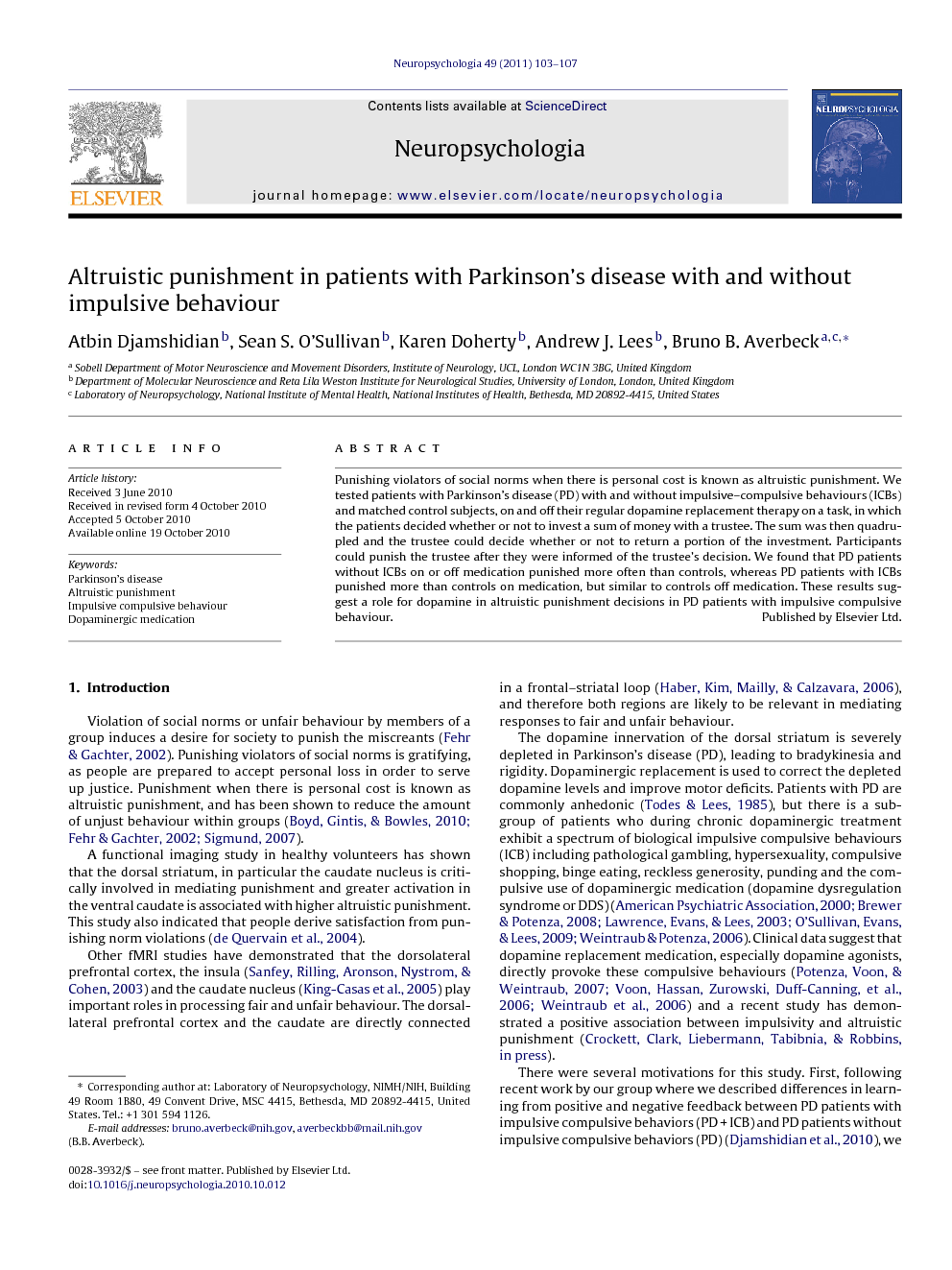Punishing violators of social norms when there is personal cost is known as altruistic punishment. We tested patients with Parkinson's disease (PD) with and without impulsive–compulsive behaviours (ICBs) and matched control subjects, on and off their regular dopamine replacement therapy on a task, in which the patients decided whether or not to invest a sum of money with a trustee. The sum was then quadrupled and the trustee could decide whether or not to return a portion of the investment. Participants could punish the trustee after they were informed of the trustee's decision. We found that PD patients without ICBs on or off medication punished more often than controls, whereas PD patients with ICBs punished more than controls on medication, but similar to controls off medication. These results suggest a role for dopamine in altruistic punishment decisions in PD patients with impulsive compulsive behaviour.
Violation of social norms or unfair behaviour by members of a group induces a desire for society to punish the miscreants (Fehr & Gachter, 2002). Punishing violators of social norms is gratifying, as people are prepared to accept personal loss in order to serve up justice. Punishment when there is personal cost is known as altruistic punishment, and has been shown to reduce the amount of unjust behaviour within groups (Boyd et al., 2010, Fehr and Gachter, 2002 and Sigmund, 2007).
A functional imaging study in healthy volunteers has shown that the dorsal striatum, in particular the caudate nucleus is critically involved in mediating punishment and greater activation in the ventral caudate is associated with higher altruistic punishment. This study also indicated that people derive satisfaction from punishing norm violations (de Quervain et al., 2004).
Other fMRI studies have demonstrated that the dorsolateral prefrontal cortex, the insula (Sanfey, Rilling, Aronson, Nystrom, & Cohen, 2003) and the caudate nucleus (King-Casas et al., 2005) play important roles in processing fair and unfair behaviour. The dorsal-lateral prefrontal cortex and the caudate are directly connected in a frontal–striatal loop (Haber, Kim, Mailly, & Calzavara, 2006), and therefore both regions are likely to be relevant in mediating responses to fair and unfair behaviour.
The dopamine innervation of the dorsal striatum is severely depleted in Parkinson's disease (PD), leading to bradykinesia and rigidity. Dopaminergic replacement is used to correct the depleted dopamine levels and improve motor deficits. Patients with PD are commonly anhedonic (Todes & Lees, 1985), but there is a subgroup of patients who during chronic dopaminergic treatment exhibit a spectrum of biological impulsive compulsive behaviours (ICB) including pathological gambling, hypersexuality, compulsive shopping, binge eating, reckless generosity, punding and the compulsive use of dopaminergic medication (dopamine dysregulation syndrome or DDS) (American Psychiatric Association, 2000, Brewer and Potenza, 2008, Lawrence et al., 2003, O'Sullivan et al., 2009 and Weintraub and Potenza, 2006). Clinical data suggest that dopamine replacement medication, especially dopamine agonists, directly provoke these compulsive behaviours (Potenza et al., 2007, Voon et al., 2006b and Weintraub et al., 2006) and a recent study has demonstrated a positive association between impulsivity and altruistic punishment (Crockett, Clark, Liebermann, Tabibnia, & Robbins, in press).
There were several motivations for this study. First, following recent work by our group where we described differences in learning from positive and negative feedback between PD patients with impulsive compulsive behaviors (PD + ICB) and PD patients without impulsive compulsive behaviors (PD) (Djamshidian et al., 2010), we hypothesized that PD + ICB patients might be less likely to punish as they might be less sensitive to the aversive aspects of the lack of reciprocation in the trust task. Second, as PD + ICB patients violate social norms themselves, we thought they might be less likely to punish others that violate social norms. Therefore, we tested PD patients with (PD + ICB) and without (PD) impulsive compulsive behaviour on and off medication and compared their results with healthy controls matched for age and education. We further hypothesized that on dopaminergic medication both groups of patients would punish to a greater amount and more frequently than when off medication given the role of the striatum in mediating punishment, and the important role of dopamine in modulating behaviours mediated by the striatum.
We have found that PD patients with ICBs respond differently than normal PD patients in a trust game in which patients can deliver punishment altruistically. Both groups of medicated patients punished more than controls, but off medication the PD group still punished more than controls, whereas there was no difference between the PD + ICB cases and healthy controls. Unravelling the factors that lead to these differences will provide important insight into impulse control behaviours, as well as the neural, pharmacological and anatomical mechanisms that underlie these tasks.


